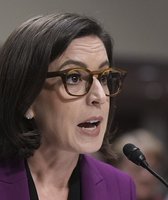Stand up for the facts!
Our only agenda is to publish the truth so you can be an informed participant in democracy.
We need your help.
I would like to contribute
President Donald Trump has said he’s considering a pardon for Joe Arpaio, the former sheriff of Maricopa County, Ariz. (Editor's note: Trump pardoned Arpaio on Aug. 25.)
Arpaio, a controversial figure for his tough stance against immigration, was convicted on July 31 for criminal contempt when he refused to follow a court order to stop detaining undocumented immigrants.
Trump, who has made opposition to immigration a centerpiece of his political efforts, told Fox News on Aug. 13 that he is "seriously considering a pardon for Sheriff Arpaio."
Then, during a Trump rally in Phoenix -- Arpaio’s backyard -- on Aug. 22, the president told the crowd, "I'll make a prediction. I think he's going to be just fine, okay? But I won't do it tonight, because I don't want to cause any controversy. Is that okay? All right? But Sheriff Joe can feel good."
With Trump on record considering a pardon for Arpaio, we decided to take a closer look at how unusual a pardon of the ex-sheriff would be.
Sign up for PolitiFact texts
Would Arpaio qualify for a pardon?
Under the Constitution -- the only authority that really matters -- the answer is yes.
As we’ve noted, Article II, Section 2, of the Constitution says the president "shall have the Power to grant Reprieves and Pardons for offenses against the United States, except in Cases of Impeachment."
The power of the pardon "is considered one of the least limited powers of the executive," said James Robenalt, a lawyer at the firm Thompson Hine.
The phrase "offenses against the United States" is generally meant to address federal criminal cases and to rule out state-level cases and civil cases. But Arpaio’s conviction was in a federal case, so that would not be a barrier.
Would a pardon of Arpaio be unusual?
Here too, the answer is yes.
"For President Trump to give such a pardon, he would be sidestepping all the regulations set up by the Justice Department’s Office of the Pardon Attorney, but he has the absolute right to do so," Robenalt said.
So what are those regular procedures? Here are some of them, according to the Office of the Pardon Attorney:
• Exhaustion of alternatives: No petition can be be filed as long as "other forms of judicial or administrative relief are available."
• Timing: The guidelines require petitioners to wait at least five years after a conviction or their release from confinement, whichever is later, before filing an application.
• Accepting responsibility: Accepting responsibility is an "important" consideration. "A petitioner should be genuinely desirous of forgiveness rather than vindication," the guidelines say.
• An examination of the petitioner’s case. The FBI typically conducts a thorough investigation, including "financial and employment stability, responsibility toward family, reputation in the community, participation in community service, charitable or other meritorious activities" and military record. After this is complete, the process of working through the department and the White House can take years.
How would Arpaio’s case fall short of these regulations?
For starters, Arpaio’s conviction occurred just a few weeks ago -- not close to five years after his release from incarceration.
Not only has he not finished his sentence, but his lawyers have said he’ll be appealing. This would mean he hasn’t exhausted all of his legal alternatives, and it would also mean he hasn’t accepted responsibility.
How unusual would it be for Trump to pardon someone so early in his tenure as president?
Pardoning early in a presidency was once common, but it is no longer the case.
Barack Obama’s first act of clemency (either a pardon or a commutation) came on Dec. 3, 2010, or 23 months into his tenure. George W. Bush’s first came on Dec. 20, 2002, also 23 months in. Bill Clinton’s came on Nov. 23, 1994, or 22 months in. You have to go back to George H.W. Bush to find a pardon in the first few months of a presidency -- on Aug. 14, 1989, or seven months into his tenure. There were nine pardons on that day, the most prominent of which was issued to Armand Hammer, who headed Occidental Petroleum and was pardoned for a misdemeanor campaign-finance violation 13 years earlier.
Are the Justice Department guidelines binding?
No. The guidelines themselves state, "The regulations contained in this part are advisory only and for the internal guidance of Department of Justice personnel. They create no enforceable rights in persons applying for executive clemency, nor do they restrict the authority granted to the President under Article II, Section 2 of the Constitution."
Rather, the value in the guidelines is to provide some degree of fairness and balance.
"The review gives another layer of checks to what is essentially an untrammeled power, as well as a sense of regularity," said Daniel Kobil, a law professor at Capital University.
Have the guidelines been ignored in the past?
Yes.
One of the most controversial pardons in presidential history was Bill Clinton’s pardon of Marc Rich, who was indicted in 1983 on charges of tax evasion and illegally buying oil from Iran. He fled the country and was considered a fugitive, but just before leaving office, Clinton pardoned Rich, whose ex-wife Denise was a major Democratic donor.
Because of Rich’s fugitive status, "DOJ wouldn't have recommended a pardon there," said Brian Kalt, a Michigan State University law professor who has studied pardons.
In fact, the department’s pardon attorney at the time, Roger Adams, testified how the White House essentially asked his office, as Clinton’s time in office was winding down, to put together paperwork to give the impression that Rich’s application had undergone their normal level of review. It had not, and the fallout continued to dog the deputy attorney general, Eric Holder, when he was being considered for attorney general eight years later. (Clinton later acknowledged that the Rich pardon "was terrible politics. It wasn't worth the damage to my reputation.")
Other presidents have pardoned political allies, to varying degrees of criticism. Gerald Ford pardoned his predecessor, Richard Nixon, after the Watergate scandal. The elder Bush pardoned Caspar Weinberger and several other officials facing a special prosecutor looking into the Iran-Contra affair. The younger Bush commuted the sentence of Scooter Libby, a former aide to Dick Cheney who was convicted of charges related to the outing of a CIA operative.
Still, Kobil said that such an early pardon could set a "particularly low bar for the use of the pardon power" during Trump’s presidency.
"It could pave the way for pardons for any type of political ally," he said. "It is not utterly unprecedented, but it is incredibly unusual, and it is directly contradictory of what the Justice Department tells the public about their eligibility."
Editor's note, Aug. 23, 2017, 9:45 a.m.: This article has been updated to include Trump's comments at the rally in Phoenix.
Our Sources
Reuters, "Trump says he may pardon Arizona ex-sheriff Arpaio: Fox News," Aug. 14, 2017
New York Times, "Former Arizona Sheriff Joe Arpaio Is Convicted of Criminal Contempt," July 31, 2017
Justice Department Office of the Pardon Attorney, "Standards for Consideration of Clemency Petitioners," accessed Aug. 22, 2017
Justice Department Office of the Pardon Attorney, "Rules Governing Petitions for Executive Clemency," accessed Aug. 22, 2017
Justice Department Office of the Pardon Attorney, "Clemency Recipients" by president, accessed Aug. 22, 2017
Justice Department Office of the Pardon Attorney, "Frequently Asked Questions Concerning Executive Clemency," accessed Aug. 22, 2017
Heritage Foundation, "The President's Broad Power to Pardon and Commute," July 9, 2007
CNN, "Bush commutes Libby's prison sentence," accessed Aug. 22, 2017
Washington Post, "Bill Clinton Says He Regrets Rich Pardon, Denies Wrongdoing," April 1, 2002
PolitiFact, "Can the president pardon himself? 4 questions about the presidential pardon," July 21, 2017
Interview with Daniel Kobil, law professor at Capital University, Aug. 22, 2017
Interview with Scott Harshbarger, former attorney general of Massachusetts, Aug. 22, 2017
Email interview with Harold H. Bruff, emeritus University of Colorado law professor, Aug. 22, 2017
Email interview with Margaret Love, U.S. Pardon Attorney between 1990 and 1997, Aug. 22, 2017
Email interview with James Robenalt, lawyer at the firm Thompson Hine, Aug. 22, 2017
Email interview with Jeffrey Crouch, assistant professor of American politics at American University, Aug. 22, 2017
Email interview with Michael Gerhardt, professor at the University of North Carolina School of Law, Aug. 22, 2017
Email interview with Brian Kalt, Michigan State University law professor, Aug. 22, 2017






































